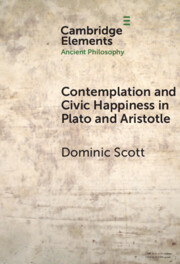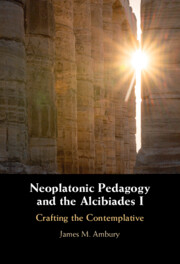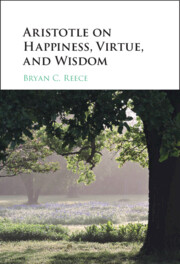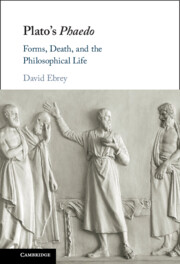Refine search
Actions for selected content:
42 results
Thomas Aquinas and Philosophy as a Way of Life
-
- Journal:
- New Blackfriars ,
- Published online by Cambridge University Press:
- 02 September 2025, pp. 1-14
-
- Article
-
- You have access
- Open access
- HTML
- Export citation
I - The Cats of Queen Berúthiel
-
- Book:
- Tolkien and the Mystery of Literary Creation
- Published online:
- 17 April 2025
- Print publication:
- 08 May 2025, pp 22-83
-
- Chapter
- Export citation

Contemplation and Civic Happiness in Plato and Aristotle
-
- Published online:
- 19 December 2024
- Print publication:
- 19 December 2024
-
- Element
- Export citation
Chapter 5 - Developmental Deification in Aristotle
-
- Book:
- Deification in Classical Greek Philosophy and the Bible
- Published online:
- 10 July 2024
- Print publication:
- 27 June 2024, pp 213-266
-
- Chapter
- Export citation
Chapter 1 - The Self-Knowledge Necessity
-
- Book:
- Neoplatonic Pedagogy and the Alcibiades I
- Published online:
- 16 May 2024
- Print publication:
- 23 May 2024, pp 12-27
-
- Chapter
- Export citation
Chapter 5 - Who Am I?
-
- Book:
- Neoplatonic Pedagogy and the Alcibiades I
- Published online:
- 16 May 2024
- Print publication:
- 23 May 2024, pp 167-209
-
- Chapter
- Export citation

Neoplatonic Pedagogy and the Alcibiades I
- Crafting the Contemplative
-
- Published online:
- 16 May 2024
- Print publication:
- 23 May 2024
1 - Introduction
-
- Book:
- Exploring Religious Pluralism
- Published online:
- 14 March 2024
- Print publication:
- 21 March 2024, pp 1-15
-
- Chapter
- Export citation
1 - Introduction
-
- Book:
- Naming God
- Published online:
- 30 June 2023
- Print publication:
- 20 July 2023, pp 1-8
-
- Chapter
- Export citation
Chapter 1 - From the Dilemmatic Problem to the Conjunctive Problem of Happiness
-
- Book:
- Aristotle on Happiness, Virtue, and Wisdom
- Published online:
- 15 June 2023
- Print publication:
- 29 June 2023, pp 1-30
-
- Chapter
- Export citation
Chapter 4 - Is Contemplation Proper to Humans?
-
- Book:
- Aristotle on Happiness, Virtue, and Wisdom
- Published online:
- 15 June 2023
- Print publication:
- 29 June 2023, pp 80-108
-
- Chapter
- Export citation

Aristotle on Happiness, Virtue, and Wisdom
-
- Published online:
- 15 June 2023
- Print publication:
- 29 June 2023

Plato's Phaedo
- Forms, Death, and the Philosophical Life
-
- Published online:
- 02 February 2023
- Print publication:
- 09 February 2023
7 - The Book of Nature
- from Part I - Concepts
-
-
- Book:
- The Cambridge Companion to Christianity and the Environment
- Published online:
- 21 July 2022
- Print publication:
- 04 August 2022, pp 96-112
-
- Chapter
- Export citation
7 - Why Erōs?
-
-
- Book:
- The Cambridge Companion to Plato
- Published online:
- 21 July 2022
- Print publication:
- 04 August 2022, pp 202-232
-
- Chapter
- Export citation
8 - Plato on Philosophy and the Mysteries
-
-
- Book:
- The Cambridge Companion to Plato
- Published online:
- 21 July 2022
- Print publication:
- 04 August 2022, pp 233-267
-
- Chapter
- Export citation
The Bride of the Holy Trinity: The Role of Mary in Mechthild of Magdeburg's Mystical Theology
-
- Journal:
- Church History / Volume 91 / Issue 2 / June 2022
- Published online by Cambridge University Press:
- 29 July 2022, pp. 245-263
- Print publication:
- June 2022
-
- Article
-
- You have access
- Open access
- HTML
- Export citation
Chapter 2 - Long walk to wisdom
- from Part I - The Republic
-
- Book:
- Explorations in Ancient and Modern Philosophy
- Published online:
- 24 March 2022
- Print publication:
- 31 March 2022, pp 73-77
-
- Chapter
- Export citation
Chapter 18 - Thomas Aquinas
- from Part IV - The 13th Century
-
- Book:
- Introduction to Medieval Theology
- Published online:
- 15 April 2022
- Print publication:
- 24 March 2022, pp 264-305
-
- Chapter
- Export citation
